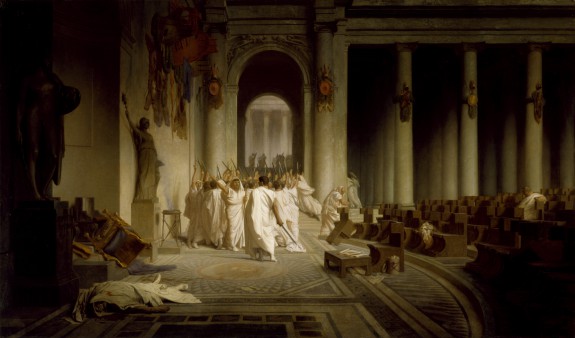Twenty three stab wounds was all it took to take down one of the most powerful leaders in Roman history. Despite being hailed as a powerful war hero in history, Julius Caesar was murdered in his own city by his own people on the Ides of March 44 B.C.E.1 Gaius Julius Caesar was born on July 13, 100 B.C.E. in Rome, and became dictator of the Roman Republic in October 49 B.C.E. The powerful image of Caesar even today cannot be compared, and that is why his legacy is still alive today. He was an ambitious figure that conquered modern day France, led the civil war, and influenced the fall of the Roman Republic. The Roman Republic before its fall served the wealthy and the privileged.2 Caesar did not want to do away with the Republic despite what critics say; all he wanted to do was reform it and give more power to the people. Members in the Senate, however, would not allow this. Julius Caesar’s assassination cannot be justified; it was treason and murder, even though those who murdered him defended their actions as tyrannicide.

The conspirators were not from outside forces of Rome; instead, they were from Caesar’s inner circle of elite senators. Caesar entrusted Brutus and Cassius to be his eyes and ears in the Senate, but they did just the opposite. Brutus, who was pardoned by Caesar after helping Caesar’s foe Pompey during the recent civil war, was one of the masterminds behind the assassination. In 44, Caesar appointed Brutus as proprietor of Gaul, or modern day France, which was one of the highest offices a nobleman could hold.3 Cassius, another conspirator who had been pardoned by Caesar at the beginning of his dictatorship, was also one of the masterminds behind the assassination. Repeatedly, Caesar seems to have contributed to his own death by pardoning those who did not deserve to be pardoned. Instead of dealing harshly with his enemies, he pardoned them and kept them close. He took the saying keep your enemies close to an extreme, since they ended up close enough to assassinate him.
In some ways, the conspirators who plotted against Caesar’s life had a clear justifiable reason in mind. The conspirators defied Caesar’s authority and perceived him to be a popular leader who threatened their privileged interests. They truly believed they were saving the Republic. They wanted to restore republican liberties that Caesar had robbed from them.4 For example, Caesar completely disregarded their unwritten constitution and the Roman mos maiorum, or ancestral customs, when he appointed commoners to offices that only aristocrats could hold. He was defying their unspoken and unwritten rule that commoners cannot be placed in charge.5 Doing away with Caesar would do good to the people of Rome; therefore, tyrannicide was justifiable in their eyes. And so their treasonous act will forever be remembered as the most infamous assassination in history.

Although some of his actions were faulty, Caesar did not deserve to die in the treacherous way that he did. Murder consists of three things and the conspirators held all three of them, which is intent, malice, and premeditation. The conspirators intended to kill Caesar before he left for Parthia on March 18, 44 B.C.E.6 The raid on Parthia would cause Caesar to be away for months on end, so the conspirators had to act quickly. They premeditated their attack before Caesar left by taking into account time, numbers, and politics. They knew Caesar would be unaccompanied and surrounded by Senate members such as themselves. They also knew that only Senate members were allowed inside the Senate chambers, prohibiting any outsiders Caesar usually surrounded himself with.7 Their malice was proven in the gruesome way Caesar was left on the steps of the Senate building. Together, they marched to the Senate, with daggers under their white togas, with intent, malice, and premeditation to kill Julius Caesar. Before Caesar’s assassination, every senator had to sign an oath in which they promised to maintain Caesar’s safety. The penalty for violating the oath was the death penalty.8 The Senators involved almost got away with murder, but Octavian, Caesar’s nephew and successor, and Marc Antony, Caesar’s best friend, hunted the assassins down one by one and avenged his murder.
- Encyclopedia Britannica, 2015, s.v. “Julius Caesar,” by Arnold Joseph Toynbee. ↵
- Michael Parenti, The Assassination Of Julius Caesar: A People’s History Of Ancient Rome (New York: The New Press, 2004), 47. ↵
- Encyclopedia Britannica, 2015, s.v. “Marcus Junius Brutus,” by E. Badian. ↵
- Parenti, The Assassination Of Julius Caesar: A People’s History Of Ancient Rome, 2. ↵
- Parenti, The Assassination Of Julius Caesar: A People’s History Of Ancient Rome, 3. ↵
- Barry Strauss, The Death of Caesar: The Story of History’s Most Famous Assassination (New York: Simon & Schuster, 2016), 54. ↵
- Greg Woolf, “Et Tu Brute? : Caesar’s Murder and Political Assassination” (London: Profile Books, 2006), 45. ↵
- Strauss, The Death of Caesar: The Story of History’s Most Famous Assassination, 51. ↵



49 comments
Claudia Sanchez
I had never read about Julius Ceasar’s death but had heard he was killed by his friends. I think it makes all the more saddening that he was murdered by those he forgave. Although they had their ‘justifications” it really did not justify murdering a great leader and a friend who could have killed you for betraying his once already. Tragic story that continues to be remembered to this day because of how tragic it is.
Christopher Metta Bexar
The article looks at the real reason Caesar was murdered and draws logical conclusions. Caesar had conquered much of what Rome possessed and was loved enough by the people to make himself emperor ( he actually didn’t want to be emperor , it was forced upon him some say in legend).
Jealousy of position has always been a motive for murder, and reason for changing governments and heads of state.
Perhaps Caesar was not wise in keeping his “frenemies” close to him?
Lyzette Flores
This story is another great example as to why it is very hard to trust anybody. Even your closest friends can betray you in such a horrible way. It is very unfair that the elite senators did not like the way Caesar was running things, therefore, decided to assassinate him in an atrocious way. However, Caesar will always be remembered as a great figure.
Noah Bolhuis
Caesar’s political power was unmatched by most throughout history. He was emperor of Rome at or near its peak, and that gave him an extreme amount of power. He seemed to be smart, and knew how to play the game of politics, maybe too well. He, as the article said, kept his friends close and his enemies closer. He should have known, or guess that some kind of coup or mutant would occur, especially with keeping his enemies of war in his elite senate group. Killing, even killing extreme political enemies is wrong, and was treasonous by definition.
Brianna Ford
I always heard about Julius Caesar but ever read up on him. Its sad to read that the two people he trusted to be his “eyes” and “ears” betrayed him in a malicious way. I was surprised that Caesar wanted a republic society, I thought he was more of a dictator ruler. It is also sad that his own senators wanted him dead and were the ones that planned out his death in cold blood. I guess they did not want commoner’s to be part of the in-crowd.
Sebastian Carnero
It is a strange idea to forgive conspirators and a stranger idea making two of them be your eyes and ears, Caesar must have considered skills over trust for those roles. When I hear about dictators I’m never told how they are merciful to their enemies. Julius Caesar was a different dictator that also considered forgiveness as a way to rule. Even though they planned hours and places for the assassination, they didn’t plan that well long-term results such as Ceasar’s allies wanting revenge.
Maria Esquivel
The people Julius Caesar pardoned were the ones who slayed him, I was not expecting that. It’s insane how he trusted the senators to protect him when he knew they were malicious individuals. Their treacherous thinking and planning was disturbing, they knew exactly when and where to kill Caesar. Although Caesar had faulty actions, I agree that he did not deserve to die in such a horrible manner.
Natalia Flores
Interesting point of view. I always thought that Caesar leaned towards a dictatorship rather than a republic so to hear that it was the opposite is mind boggling. It’s creepy and cold blooded how the senators planned out Caesar’s murder and thought about how to get him alone. Their reason that he was tyrannical because he wanted to put commoner’s in the inner circle makes sense because the commoners would take away their power.
Nathan Hudson
I always thought of Caesar as a tyrant, and I enjoyed reading that he wasn’t. Wealthy people have the ability to do many terrible things and get off scott-free. But you can’t just blame them because, like you wrote, he kept his enemies a little too close. Reading this makes me wish that he wasn’t assassinated so that the Roman culture could live and grow, but who knows what this world would be like if that were the case.
Belia Camarena
I remember learning about Julius Caesar in world history, but I did not know that one of his main focuses as the leader of the Roman empire was to take power from the privileged and give it to the people. It is sad to think that Caesar’s good intentions came back to hurt him, since he was assassinated by the men he pardoned and welcomed into his inner circle.